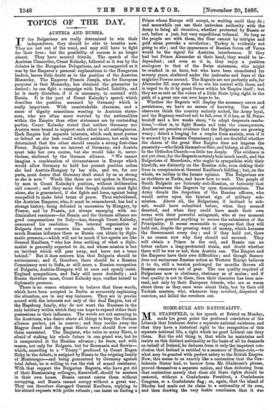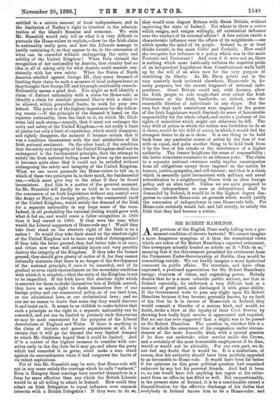HOME-RULE AND NATIONALITY.
MR. STANSFELD, in his speech at Bristol on Monday, made his great point the profound conviction of the Liberals that Irishmen desire a separate national existence, and that they have a historical right to the recognition of this separate national life, a right which no good Liberal can deny them. But the odd thing is, that while he maintains and insists on this distinct nationality as the basis of all he demands on behalf of Ireland, he deduces from it only the impotent con- clusion that Ireland is entitled to a measure of Home-rule,--to what may be granted with perfect safety to the British Empire. Now, this seems to us exactly like a contention that the Con- federate States had, to borrow from Mr. Gladstone's phrase, proved themselves a separate nation, and then deducing from that contention merely that their old State rights should be restored, without a Confederate President, a Confederate Congress, or a Confederate flag ; or, again, that the island of Rhodes had made out its claim to a nationality of its own, and then drawing the very feeble conclusion that it was
entitled to a certain amount of local independence, and to the limitation of Turkey's right to interfere in the adminis- tration of the island's finances and economy. We wish Mr. Stansfeld would only tell us what it is very difficult to persuade the Home-rulers to explain,—how far the Irish claim to nationality really goes, and how the Liberals manage to justify restricting it, as they appear to do, to the concession of what can be conceded without endangering the unity and solidity of the United Kingdom? When Italy claimed the recognition of her nationality by Austria, that country had no idea at all of asking only for what Austria could concede con- sistently with her own safety. When the States of North America rebelled against George IIL, they never dreamed of limiting their claim to such a measure of local independence as they thought that George III. and his people could safely concede. Nationality means a good deal. You might as well identify a claim of distinct nationality with a claim for Home-rule, as identify a claim for absolute personal liberty with a claim to be allowed, within prescribed limits, to work for your own behoof. The point is of the highest importance for the follow- ing reason :—If the principle of the demand is based on the separate nationality, then the limit to it, on which Mr. Glad- stone laid such stress,—namely, that it must not endanger the unity and safety of the United Kingdom,—is not really a limit of justice but only a limit of expediency, which would disappear, and rightly disappear, the moment it became certain that it was a condition inconsistent with the real satisfaction of the Irish national sentiment. On the other hand, if the condition that the safety and integrity of the United Kingdom shall not be endangered is the fundamental principle, then the attempt to satisfy the Irish national feeling must be given up the moment it becomes quite clear that it could not be satisfied without endangering the safety and integrity of the United Kingdom. What we can never persuade the Home-rulers to tell us, is which of these two principles is, in their mind, the fundamental one,—which must give way to the other if they be found inconsistent. And this is a matter of the greatest moment, for Mr. Stansfeld will hardly be so bold as to maintain that the concession of an Irish Legislature without any control over the Army or Navy, or foreign policy, or the commercial tariff of the United Kingdom, would satisfy the demand of the Irish for a separate nationality in any large sense of the term. Indeed, in all probability the national feeling would grow with what it fed on, and would crave a fuller recognition in 1896 than it had craved in 1886. If that were the case, what would the Liberal supporters of Home-rule say ? Would they take their stand on the absolute right of the Irish to be a nation I Or would they take their stand on the absolute right of the United Kingdom not to incur any risk of disintegration? If they take the latter ground, they had better take it at once, and refuse now what will certainly injure and very possibly destroy the integrity of the Kingdom. If they take the former ground, they should give plenty of notice of it, for they cannot rationally maintain that there is no danger of the development of the national principle, if once it be conceded, and of its gradual or even rapid encroachment on the secondary condition with which it is coupled,—that the unity of the Kingdom is not to be imperilled. If the Irish have this absolute right which is asserted for them to shake themselves free of British control, they have as much right to shake themselves free of our foreign policy and our commercial policy, as of our land laws, or our educational laws, or our ecclesiastical laws ; and we can see no reason to doubt that some day they would discover it and insist on it. It seems to us childish to make-believe that such a principle as the right to a separate nationality can be conceded, and yet can be limited to precisely such dimensions
as may be most convenient for the purposes of the Liberal Associations of England and Wales. If there is anything in the claim of historic and generic separateness at all, it is certain that it will go far beyond the very limited demand-
to which Mr. Gladstone hoped that it could be limited. And it' is a matter of the highest moment to consider with our- selves early in the day, how far it may go, and where the party which had conceded it in germ, could make a sure stand against its encroachments when it had outgrown the limits of its infant aspirations. For of this Mr. Stansfeld may be sure, that Home-rule will not in any sense satisfy the cravings which he calls "national."
Even in Hungary those cravings have asserted themselves in a form far more effective than any which the British Liberals would be at all willing to admit in Ireland. How could they admit an Irish Delegation to equal influence over common interests with a British Delegation If they were to do al, they would soon disgust Britons with Great Britain, without improving the state of Ireland. Yet-Where is there a nation which resigns, and resigns willingly, all substantial influence over the conduct of its external affairs t A free nation exerts a characteristic influence over the affairs of its neighbours,-0118 which speaks the mind of its people. Ireland is, or at least thinks herself, in the main Celtic and Catholic. How could she recognise her influence in a policy which was in the main Teutonic and Protestant I And even if it were not so, there is nothing which more habitually irritates the sensitive pride of an independent Legislature than Constitutional walls built up by the will of an alien race for the very purpose of restricting its liberty. As Mr. Dicey points out in the very masterly book reviewed elsewhere, Home-rule is, for many purposes, but the merest fragment of national inde- pendence. Great Britain could not, with decency, allow the Irish people to ride rough-shod over either the Irish Protestants or the Irish landlords, or, indeed, over the reasonable liberties of individuals in any shape. But the very fact that such restrictions were imposed on the power of the Irish Legislature would diminish its sense of honourable responsibility for the whole island, and excite a jealousy of the rights of minorities which might not otherwise be felt. The very field of action in which the nation was forbidden to do as it chose, would be the field of action in which it would feel the strongest desire to do as it chose. It is one thing to be held back from any particular course of action by the fear of war with an equal, and quite another thing to be held back from it by the fear of the rebuke or the interference of a higher authority. The former heightens the sense of responsibility ; the latter stimulates resistance to an irksome yoke. The claim to a separate national existence really implies emancipation from all obligations except those imposed on the nation by honour, justice, sympathy, and self-interest ; and that is a claim which is assuredly quite inconsistent with military and naval subordination to a neighbouring Power with an alien foreign policy and an alien tariff. Unless we are quite prepared to concede independence so soon as independence shall be. demanded by Ireland, it would be in the highest degree dan- gerous to concede Home-rule on grounds which would justify the concession of independence in case Home-rule fails. For Home-rule certainly would fail, and fail utterly, to satisfy the. Irish that they had become a nation.



































 Previous page
Previous page